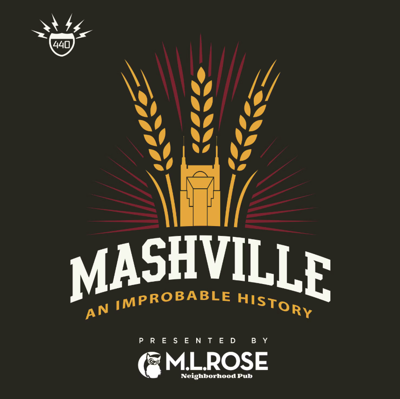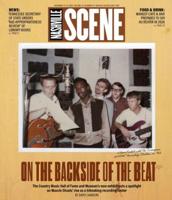
It feels like decades ago since I released my third book, Nashville Beer: A Heady History of Music City Brewing — but it was actually only 11 years ago. Of course, the book needed updating as soon as the ink was dry because I released it right at the beginning of the second boom of local craft brewery openings.
Having neither the time nor the inclination to update the book over the past 10 years, I was really pleased when local podcast auteur Braden Gall reached out to me last year to collaborate on a podcast idea he had percolating. I’ve been a fan of Braden’s for years as a listener to his various sports and media radio shows on terrestrial radio and cable and on his burgeoning podcast network 440 Sports. Beyond sports, he also covers media and politics with co-hosts like my former Scene editor/current Nashville Banner editor Steve Cavendish and former Metro Councilmember Jamie Hollin, so I was intrigued when he wanted to work with me to create his first scripted podcast series.
My book mainly revolved around the history of Nashville brewery expansion from the post-Civil War era until the mid-2010s, relying heavily on the previous work of local beer historian Scott Mertie to memorialize the earliest days of the pre-Blackstone and pre-Yazoo era. What Gall wanted to concentrate on was describing the parallels between the growth of Nashville as a part of the national zeitgeist with the brewery boom of 2011 until (regrettably) recently, when the number of local craft breweries seems to have peaked and entered retrograde.
Gall has partnered with M.L. Rose Neighborhood Pub as a sponsor and contracted me (full disclosure: as a paid writer) to create and produce a seven-part podcast titled Mashville: An Improbable History that tells the story of the fascinating characters who have contributed to the growth of the city and the brewing industry over the past decades. (Don’t tell Braden, but I knew going in that I liked all the people involved so much that I would have done the project for free. OK, maybe for cheap.)
Over the course of the year of production, Gall interviewed more than two dozen people who were instrumental in turning Nashville from an almost exclusively Bud/Miller/Coors town into a regional craft beer powerhouse. From Yazoo’s Linus Hall (who Cavendish accurately describes as “low-key hilarious”) to former monkey biologist and Jackalope co-founder Bailey Spaulding to Tennessee Brew Works principal Christian Spears (who was working at a leper colony before he entered the brewing business), the stories of the brewers on Mashville are the highlight of the history. That’s not even mentioning the droll humor of Black Abbey’s Carl Meier, who makes me double up in laughter just about every time I hear him talk.
Gall traces his personal stories of growing into adulthood and parenthood in Nashville in parallel with the growth of breweries in the neighborhoods where he has lived and raised a family since he moved back to Nashville after college. (I was already older during the rise of craft beer in town, so my origin stories would have revolved around a friend spending the money his grandmother gave his for his Eagle Scout project to buy 10 cases of Coors when the elusive Colorado beer first made its way to Middle Tennessee in the mid-1980s, and then spending the balance of grandma’s gift on a storage locker to hide our purchase from our parents because we were still underage. Nobody wants to hear that story.)
If you've toiled in Nashville's rock scene for any amount of time, you've no doubt heard of the dreaded Nashville Curse. After Jason and the N…
The first three episodes of Mashvllle dropped last week on Apple, iHeartRadio, Spotify and wherever else you might get your podcasts, and the final four episodes will be available before the end of this week. Most of the episodes are between 10 and 20 minutes long (or less than a beer as I like to describe them), so it’s definitely bingeable. If you’re interested in hearing the stories of The Ancients like me or the current generation of cultural leaders like Braden, Christian, Bailey et al., I strongly encourage you to check out Mashville! (You’ll also hear the musings of Scene editor D. Patrick Rodgers as he explains “The Nashville Curse” and what Nashville’s national reputation was as a cultural contributor in the early 2010s.)
And selfishly, if you’d like to rate and/or review Mashville on your favorite podcast provider, that’s always helpful to draw listeners to the pod. It’s not like I would make any extra money from that, but I’d sure love to share the work we spent a year on with more people. Regardless, I hope you enjoy it and learn something new about Nashville!






